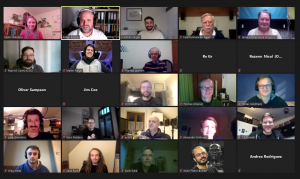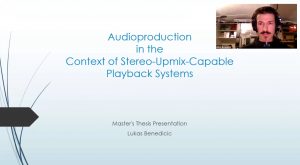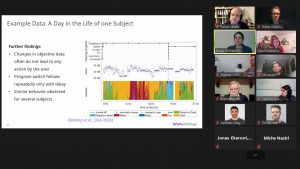Research Colloquia 2021 – AES South German Section
All Sessions are archived at the South German Section Blog.
Research Colloquium #3: From Algorithmic to Neural Beamforming – Two Approaches to Multichannel Speech Separation in Pro Audio

Jonathan’s presentation focused on microphone arrays that use beamforming to enhance their output signal by manipulating and combining the individual sensor signals. He analyzed an algorithmic and machine learning approach for different microphone array configurations. Under laboratory conditions and in practical applications, he examined the tracking performance, which he also made audible to the audience through several audio examples. For more complex applications, he developed a neural network beamforming approach. Jonathan explained the basic network architecture and highlighted advantages of this method. In addition, various aspects of the usability of the approaches in different applications were emphasized.
We thank Jonathan for a very impressive talk with a professional and well understandable presentation of this complex topic. We wish him all the best for his PhD defense.
A recording of the presentation is available on YouTube.
More information about Jonathan’s work
Research Colloquium #2: Audio Production in the Context of Stereo-Upmix-Capable Playback Systems
 Lukas presented work which he completed for his masters thesis. This started with an analysis of an upmix algorithm implemented on a smart speaker. With the knowledge, he developed five criteria that can be used as production guidelines. They make it possible to improve the music reproduction of the upmixing device by enhancing the effect of spatial audio while maintaining the compatibility with a standard stereo playback. This knowledge can be used by producers to optimise their material for spatial audio applications on smart speakers and soundbars. Lukas demonstrated various music excerpts from a self-designed piece of music in mono and stereo, which were upmixed by the algorithms in the smart speaker as part of his analysis.
Lukas presented work which he completed for his masters thesis. This started with an analysis of an upmix algorithm implemented on a smart speaker. With the knowledge, he developed five criteria that can be used as production guidelines. They make it possible to improve the music reproduction of the upmixing device by enhancing the effect of spatial audio while maintaining the compatibility with a standard stereo playback. This knowledge can be used by producers to optimise their material for spatial audio applications on smart speakers and soundbars. Lukas demonstrated various music excerpts from a self-designed piece of music in mono and stereo, which were upmixed by the algorithms in the smart speaker as part of his analysis.
We thank Lukas for this great presentation, the impressive demos and wish him all the best for the future.
A recording of the presentation is available on YouTube.
Find out more about Lukas’ research:
Research Colloquium #1: Ecological Momentary Assessment – Evaluating Hearing Aids in Real Life

The presentation by Nadja Schinkel-Bielefeld was the first event of the 2021 Research Colloquium series hosted by the AES South German Section. The presentation was attended by a live audience of as many as fifty people.
Nadja pointed out the great need for properly fitting hearing aids in real life and the resulting potential to empower the client. To evaluate hearing aid settings in real life, ecological momentary assessment (EMA) is a method to support laboratory tests with field experiments and practical usage of hearing aids in everyday life. Feedback was obtained from the test participants using a smartphone application which also records data from the hearing aids. Nadja presented the research she is conducting with her team. Results showed that, although data is difficult to interpret as there are many influencing factors to consider when working with humans, useful insights can be gained from EMA tests. Furthermore, she pointed out methods to minimize systematic biases to get reliable data from EMA hearing aid tests and even showed how this method can be used to perform contactless research during the Covid-19 pandemic.
We say thank you to Nadja for the very impressive, informative talk and sharing her research with us!
A recording of the talk is available on YouTube.
